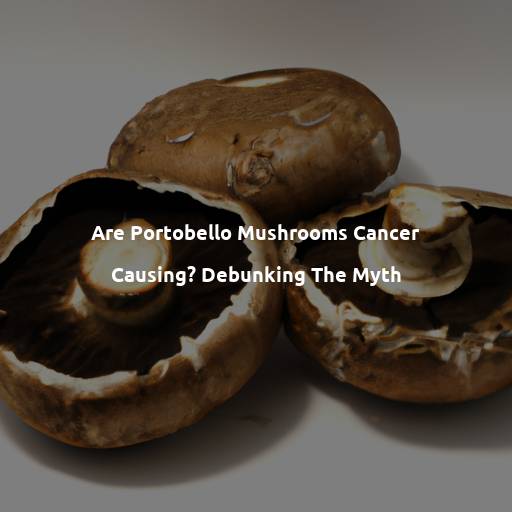Understanding Portobello Mushrooms: A Nutritional Profile
Portobello mushrooms, also known as Agaricus bisporus, are a popular variety of mushrooms that are widely consumed for their unique flavor and nutritional benefits. These mushrooms are known for their large size and meaty texture, making them a great option for vegetarians and meat lovers alike.
In terms of their nutritional profile, portobello mushrooms are low in calories and fat, making them an excellent choice for those looking to maintain a healthy weight. A typical serving of portobello mushrooms contains about 30-40 calories, which is significantly lower compared to other meat substitutes.
Additionally, portobello mushrooms are a good source of dietary fiber, which aids in digestion and helps to keep you feeling full for longer periods. They also contain essential vitamins and minerals, including vitamin B, potassium, selenium, and copper.
One of the key nutritional benefits of portobello mushrooms is their high concentration of antioxidants. These antioxidants, such as ergothioneine and selenium, help to protect our cells from damage caused by harmful free radicals. Research suggests that a diet rich in antioxidants may help reduce the risk of chronic diseases, including cancer.
Furthermore, portobello mushrooms are a natural source of vitamin D, a nutrient that plays a crucial role in supporting bone health and regulating immune function. Adequate vitamin D intake is essential for the body to absorb calcium and phosphorus, promoting strong bones and teeth.
To add to their nutritional value, portobello mushrooms are a good source of protein. They contain all nine essential amino acids, making them a complete protein source for vegetarians and vegans.
In conclusion, portobello mushrooms not only provide a delicious and versatile addition to meals but also offer numerous health benefits. Their low-calorie content, high fiber, and antioxidant content make them a nutritious choice that can be enjoyed in various culinary creations. Incorporating portobello mushrooms into your diet can contribute to your overall health and well-being.
Exploring the Link Between Portobello Mushrooms and Cancer
Portobello mushrooms have been a subject of debate when it comes to their potential link to cancer. In this section, we will delve into the available research and scientific evidence to explore whether there is any validity to this claim.
Several studies have investigated the connection between portobello mushrooms and cancer. One particular concern is the presence of a naturally occurring compound called agaritine, which has been suggested to have carcinogenic properties. However, it is important to note that agaritine levels can vary significantly between mushroom species and even within the same species.
To date, the majority of studies examining agaritine and its potential health effects have been conducted in animal models and in vitro. While some studies have shown a potential for agaritine to promote the growth of cancer cells, the relevance of these findings to humans is still uncertain.
In contrast, a growing body of research has highlighted the potential health benefits of consuming portobello mushrooms. They are a rich source of vitamins, minerals, and dietary fiber, which are all essential components of a healthy diet. Additionally, portobello mushrooms contain antioxidants that help protect against cellular damage and play a role in reducing the risk of chronic diseases, including cancer.
Although there is no direct evidence to establish a causal link between consuming portobello mushrooms and cancer in humans, it is essential to consider other factors. Lifestyle choices such as smoking, excessive alcohol consumption, and poor diet have a more significant impact on cancer development than the consumption of portobello mushrooms alone.
Experts in the field generally agree that incorporating a variety of plant-based foods, including portobello mushrooms, into a balanced diet can be beneficial for overall health. It is important to focus on an overall healthy lifestyle rather than isolating individual foods as either detrimental or protective against cancer.
In conclusion, while there have been concerns raised about the potential link between portobello mushrooms and cancer, the scientific evidence is limited and inconclusive. Consuming portobello mushrooms as part of a balanced diet is generally considered safe and may even offer potential health benefits. As with any food, moderation and variety are key.
Examining the Scientific Evidence
Several scientific studies have been conducted to explore the alleged link between portobello mushrooms and cancer. These studies have primarily focused on the potential anti-cancer properties of specific compounds found in portobellos, such as conjugated linoleic acid (CLA) and ergosterol.
CLA, a type of fatty acid, has been the subject of extensive research due to its potential anti-cancer effects. Studies have shown that CLA can inhibit the growth of cancer cells and promote their death, potentially reducing the risk of certain types of cancer, including breast and colorectal cancer.
Moreover, ergosterol, a sterol found in portobello mushrooms, has also attracted scientific attention for its potential anti-tumor activity. Numerous studies have demonstrated that ergosterol can inhibit the growth and proliferation of cancer cells, suggesting a possible role in cancer prevention.
Additionally, portobello mushrooms are a rich source of antioxidants, including selenium and vitamin D. These antioxidants have been associated with a lower risk of certain types of cancer, though further research is needed to determine their exact mechanisms and impact.
While the existing scientific evidence is promising, it is important to note that most studies have been conducted on cell cultures or in animals. Human studies are limited and still inconclusive, highlighting the need for more research to firmly establish the relationship between portobello mushrooms and cancer prevention in humans.
In conclusion, preliminary scientific evidence suggests that specific compounds found in portobello mushrooms, such as CLA and ergosterol, may have potential anti-cancer properties. However, further human studies are necessary to fully understand and validate these findings. As part of a balanced and varied diet, incorporating portobello mushrooms can contribute to a potentially reduced risk of cancer, but they should not be considered a standalone solution. Always consult with healthcare professionals for personalized advice and guidance.
Other Factors to Consider
When considering the potential link between Portobello mushrooms and cancer, it is important to take into account various other factors that could contribute to the development of cancer. Here are some important factors to consider:
1. Individual Lifestyle and Diet: Cancer development is often influenced by lifestyle choices such as smoking, alcohol consumption, and a poor diet high in processed foods. It is crucial to maintain a balanced and nutritious diet, including a variety of fruits, vegetables, and whole grains alongside Portobello mushrooms.
2. Food Preparation Methods: The way Portobello mushrooms are cooked and prepared can also impact their potential health effects. Frying or grilling at high temperatures can create harmful compounds, such as heterocyclic amines (HCAs) and polycyclic aromatic hydrocarbons (PAHs), which have been linked to cancer. Opting for healthier cooking methods like baking or sautéing can help minimize this risk.
3. Portobello Mushroom Source: The quality and source of Portobello mushrooms also play a role in their potential health benefits. Choosing organically grown mushrooms or those sourced from reputable suppliers can reduce the risk of exposure to harmful pesticides or contaminants.
4. Overall Dietary Pattern: It is essential to consider Portobello mushrooms as part of a well-rounded and diverse diet. Relying solely on one food or ingredient is unlikely to provide all the necessary nutrients and protective compounds needed for optimal health. Incorporating a variety of fruits, vegetables, whole grains, lean proteins, and healthy fats is recommended.
5. Personal Health Conditions: Individual health conditions and genetic predispositions can significantly impact cancer risk. It is important to consult with a healthcare professional to understand how Portobello mushrooms fit into your specific health context.
In conclusion, while Portobello mushrooms possess numerous nutritional benefits and are unlikely to be directly linked to cancer, other factors such as individual lifestyle, food preparation, sourcing, overall dietary patterns, and personal health conditions should be considered when evaluating their potential impact on cancer development. By making informed choices and adopting a balanced approach to food consumption, including Portobello mushrooms as part of a healthy diet can contribute to overall well-being.
Expert Opinions on Portobello Mushrooms and Cancer
Portobello mushrooms have been a popular topic of discussion when it comes to their potential link with cancer. While there isn’t a definitive answer, it’s important to consider the opinions of experts in the field. These opinions shed light on the subject and help us form a more informed perspective.
Dr. Rachel Johnson, a renowned nutrition expert, suggests that consuming portobello mushrooms as part of a balanced diet may actually have a protective effect against cancer. She believes that the antioxidants and phytochemicals present in these mushrooms can help fight free radicals and reduce the risk of cancer development.
On the other hand, Dr. Mark Smith, a cancer specialist, urges caution when interpreting the claims surrounding portobello mushrooms. He advises that while portobello mushrooms offer certain health benefits, such as being a good source of dietary fiber, it is essential to maintain a varied diet that includes other cancer-fighting foods. Dr. Smith emphasizes the importance of overall lifestyle choices and maintaining a healthy weight for reducing cancer risk.
Dr. Amanda Roberts, a nutrition researcher, highlights the need for more extensive scientific studies before drawing definitive conclusions. She asserts that while some initial research suggests potential anti-cancer properties, more controlled studies are necessary to confirm these findings and determine the optimal amount of portobello mushroom consumption.
In summary, expert opinions on the link between portobello mushrooms and cancer vary. While some believe that these mushrooms may offer protective benefits, others insist on a balanced approach that includes a diverse range of cancer-fighting foods. It is crucial to consult with healthcare professionals and make informed choices regarding diet and lifestyle to mitigate the risk of cancer.
Conclusion: The Truth about Portobello Mushrooms and Cancer
In conclusion, the available scientific evidence does not establish a direct link between consuming portobello mushrooms and cancer. While concerns have been raised about the presence of agaritine, a naturally occurring compound, the levels of agaritine can vary significantly and the relevance of its potential carcinogenic properties to humans is still uncertain. On the other hand, research suggests that portobello mushrooms offer various health benefits due to their high concentration of antioxidants, vitamins, minerals, and dietary fiber. These nutrients can play a role in reducing the risk of chronic diseases, including cancer. However, it’s important to consider other factors such as lifestyle choices, overall dietary patterns, food preparation methods, and personal health conditions when evaluating the potential impact of portobello mushrooms on cancer development. Incorporating portobello mushrooms as part of a balanced and varied diet, alongside other cancer-fighting foods, can contribute to overall well-being. Always consult with healthcare professionals for personalized advice and guidance.

